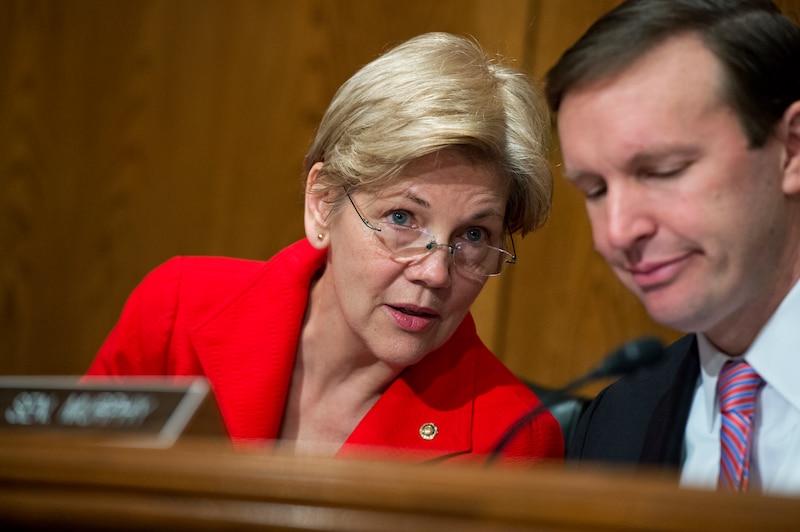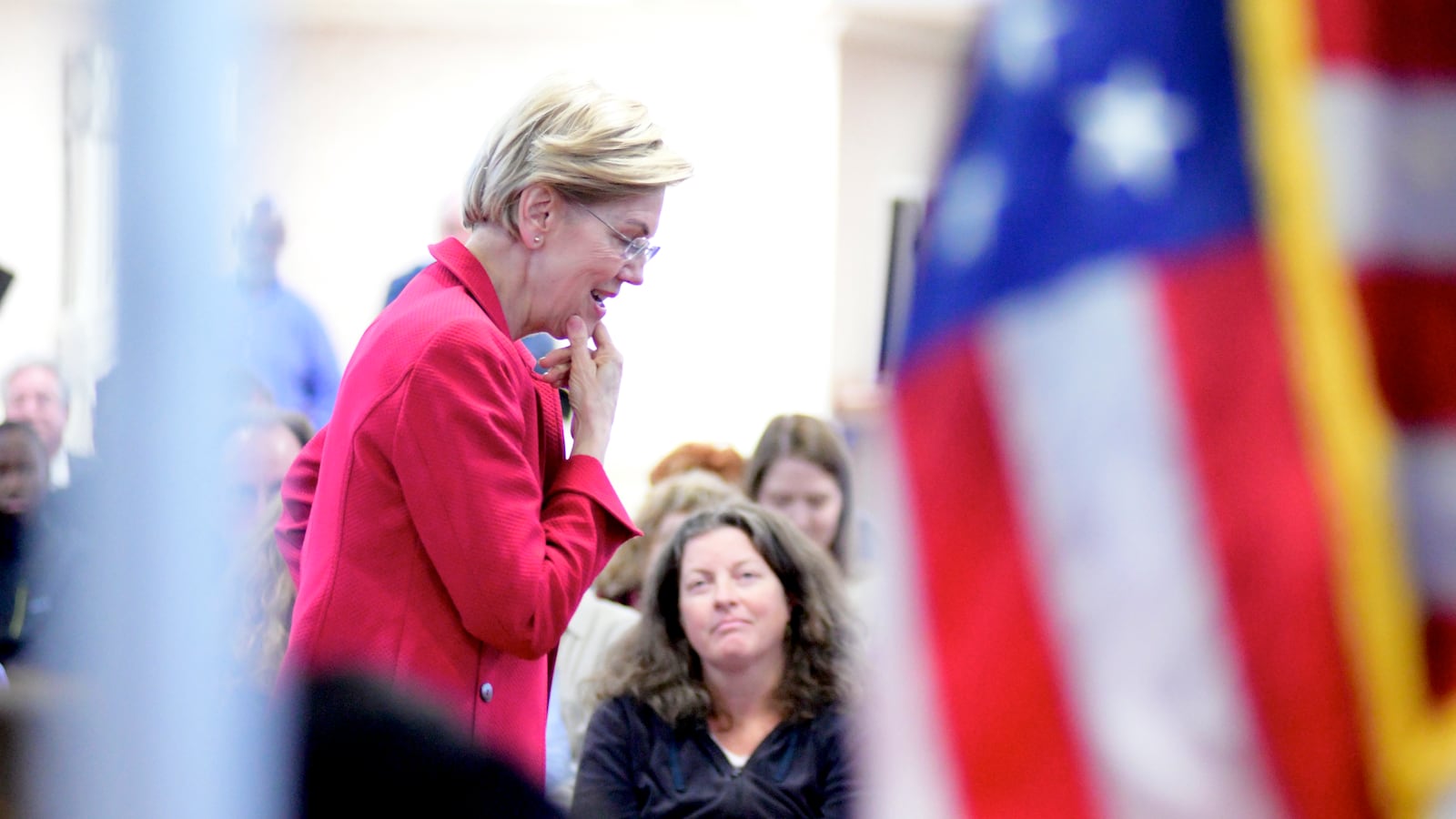Massachusetts Senator Elizabeth Warren wants voters to know she was a teacher. Her stint as a teacher of students with disabilities early in her career, she often says, was the fulfillment of a childhood dream.
But the Democratic presidential candidate, law professor, and frontrunner in Iowa (according to a poll released this week) hasn’t said much about her plans for the nation’s public elementary, middle, and high schools.
Vocal on the campaign trail about her proposals to expand pre-kindergarten and make college more affordable, Warren has yet to release a comprehensive K-12 education plan. A campaign spokesperson did not respond to questions about her K-12 positions, whether a plan was in the works, or who is advising Warren on education issues.
So Chalkbeat reviewed her writing, her record in the Senate, and comments she’s made at the Democratic debates and teachers union forums to get a better sense of where she stands.
A few patterns emerge — and on the hot-button issues that have divided Democrats, like charters and testing, Warren has offered a little something for everyone.
She has been a staunch advocate for holding schools accountable for their test scores and graduation rates, describing that data as a tool to push for racial equity, though more recently she’s criticized “high-stakes testing.” She has also praised charter schools in her home state while pushing for greater oversight of the schools nationally, especially those run by for-profit companies.
“I think her position, in many ways, is an evolving position,” said Carol Burris of the Network for Public Education, a group that opposes charter schools and policies it sees as putting public education in private hands.
Warren has also taken positions likely to earn enthusiastic union support, taking aim at Education Secretary Betsy DeVos and opposing private-school vouchers.
“Like all of the Democratic candidates, she’s trying to find a way to thread the needle between winning the support of teachers unions and wanting to present herself as a strong advocate for civil rights,” said Martin West, a professor of education at Harvard.
Here’s what else you should know.
Warren doesn’t support publicly-funded vouchers for private schools — but she’s voiced skepticism about assigning students to schools based on where they live.
In the 2004 book that Warren co-authored with her daughter, “The Two-Income Trap,” Warren argued for a program that would allow parents to choose from all public schools in their area.
“Students would be admitted to a particular public school on the basis of their talents, their interests, or even lottery numbers; their zip codes would be irrelevant,” she wrote. “Ultimately, an all-voucher system would diminish the distinction between public and private schools.”
Some have tried to link that idea to publicly funded vouchers for private schools, something DeVos favors. Warren says the two are unconnected. A website paid for by Warren’s campaign says she “believes private school voucher programs are dangerous, cost taxpayers billions of dollars … and have been used to further racial and socioeconomic segregation.”
During DeVos’ contentious 2017 confirmation process, Warren asked DeVos how she would ensure that voucher programs followed federal education laws, including civil rights laws, and “do not result in public school funding cuts.”
Warren voted against expanding charters in Massachusetts, but has expressed support for Boston’s charter schools.
Warren voted against a Massachusetts ballot measure that would have lifted the state’s cap on charter schools in 2016. (The measure failed.) In a statement, Warren told the Boston Globe that while “many charter schools in Massachusetts are producing extraordinary results for our students,” she was concerned about the financial impact of more charters on cash-strapped school districts.
Some charter proponents say her “no” vote didn’t come as a surprise, given that a Republican governor was leading the charge. And there doesn’t seem to be any lasting bitterness: Last week, the head of Massachusetts’ charter school association told Chalkbeat that the organization applauds “Warren’s commitment to public education.”
Warren has continued to offer praise for Boston’s charter schools, calling them “among the best-performing charter schools in the nation” at a 2018 Senate hearing. (That claim is largely backed by research.) At the same hearing, Warren attributed that success to limits on who can issue charters in Massachusetts, a cap on their numbers, and a ban on their operation by for-profit companies. “More oversight and more accountability works for our kids,” she said.
In July, Warren told the American Prospect she wouldn’t seek additional federal funding for charter schools if elected president.
All told, Burris sees Warren’s record as being “somewhere in the middle of the field” between Sen. Bernie Sanders — who’s called for a moratorium on charter school expansion — and Sen. Cory Booker, a proponent of charter schools and other policies associated with education reform.

Warren was a leading proponent of making sure the new federal education law had provisions that held schools accountable for test scores. Now, she says, “We do not need high-stakes testing.”
Warren has said repeatedly that she views the country’s main K-12 education law, the Every Student Succeeds Act, as civil rights legislation that should be used to send federal money to the country’s most vulnerable students.
Warren pushed for the final version of the law to require 95% of students in every school to be tested each year and to say that schools should face outside intervention if they are among the lowest-performing 5% in their state or if they fail to graduate at least two-thirds of their students. She was “deeply concerned that without stronger accountability, billions of dollars in taxpayer money would not actually reach those schools and students who needed them the most,” she explained in a December 2015 speech.
That position put her at odds with the head of the Massachusetts Teachers Association, which wrote earlier that year that Warren’s “concern for traditionally underserved students … was distorted by a seeming unwillingness to accept what so many teachers and parents are saying: that the use of testing for accountability is narrow-minded” and “undermines meaningful teaching and learning.”
Earlier this year, though, at a forum hosted by the National Education Association, the country’s largest union, Warren seemed to do an about-face when asked about testing by a retired teacher.
“Education is what goes on in the classroom, what a teacher has set as the goal, and when a kid gets there, it is a teacher who knows it,” Warren said. “We do not need high-stakes testing.”
The distinction may come down to the contested meaning of “high stakes.” Still, West, the Harvard professor who also advised the ranking Republican member of the Senate’s education committee while ESSA was being drafted, finds the tone shift notable.
“I find it hard to reconcile the stance she took in the ESSA debate with her recent comments about standardized testing,” he said. While ESSA does ask states to use other factors to measure student success and school quality, test scores remain among the most important.
She’s courted teachers unions.
Randi Weingarten, the head of the American Federation of Teachers, gave Warren a warm welcome at a May town hall event, describing Warren as someone who “understands the need of unions” and “the aspiration of public education.”
Several times, Warren has promised to strengthen teachers unions by making it easier to join a union and giving unions more power to negotiate. And at the NEA’s July forum she praised teachers who’d led strikes and walkouts in West Virginia, Arizona, Oklahoma and other states. “It was a lesson not only in what teachers need to be able to survive,” Warren said, “it was a lesson in democracy.”
Warren has also vowed to appoint someone with experience teaching in a public school as her education secretary. “Betsy DeVos need not apply,” she quipped in Detroit earlier this year.
She’s been a close observer of school segregation, and has raised questions about racial gaps in access to advanced programs.
Warren’s track record of paying attention to school integration goes back to her time as a law student. In 1975, she wrote a law review article on the Supreme Court’s Milliken v. Bradley decision, which made it more difficult for suburban school districts to take part in desegregation plans, arguing that it would lead to more “separate and unequal” schools.
As a senator, she’s pushed for the federal government to collect demographic data that would allow for fine-grained information on students’ academic performance by race and disability. “States and local communities can’t address persistent achievement gaps if they don’t have good data about what’s gone wrong,” Warren said during a 2016 ESSA hearing.
Later that year, she quizzed Education Secretary John King about civil rights data showing that most high schools serving black and Latino students don’t offer calculus — and asked how his proposed rules would “help close these critical opportunity gaps.”
More recently, she co-sponsored the Strength in Diversity Act, legislation that would create a modest federal program to fund school integration initiatives. When Joe Biden came under fire for his comments opposing busing for desegregation, Warren said she supported it.
She’s similar to other Democrats in her support for school discipline reform.
In her criminal justice plan, Warren says students of color often “bear the brunt” of school suspensions and expulsions, and says she would provide schools with federal funding for trauma-informed training. Police officers assigned to schools should be required to undergo training in youth development and de-escalation, she says, and school truancy should not be a crime.
Many expect Warren would re-issue the Obama-era guidance aimed at reducing racial disparities in school discipline that DeVos rescinded last year. In her criminal justice plan, Warren says she’d direct more money to the Department of Education’s Office for Civil Rights to investigate school discipline disparities.
She wants the federal government to invest in teacher training and sees promise in non-traditional teacher prep programs.
In 2015, Warren was highly critical of a draft of ESSA that gave states greater flexibility in how they’d spend federal funding for teacher and principal training. It was “not a responsible use of federal tax dollars” because there was no assurance “that states will actually use this federal money to help teachers do their jobs,” she said.
At the May AFT Town Hall, when asked about how she would invest in the teaching profession, Warren pointed out that she’d “fought hard” to keep federal dollars going toward teacher training.
At a 2014 Senate hearing on teacher preparation, Warren praised teacher residencies in Boston, saying they’d had “great successes.” Such residencies typically compensate student teachers and offer mentorship and practice teaching in schools.
Research has shown that residents are more diverse and more likely to stay in the profession than typical teacher candidates, though it’s unclear if they are more effective than teachers who went through more traditional prep programs.


